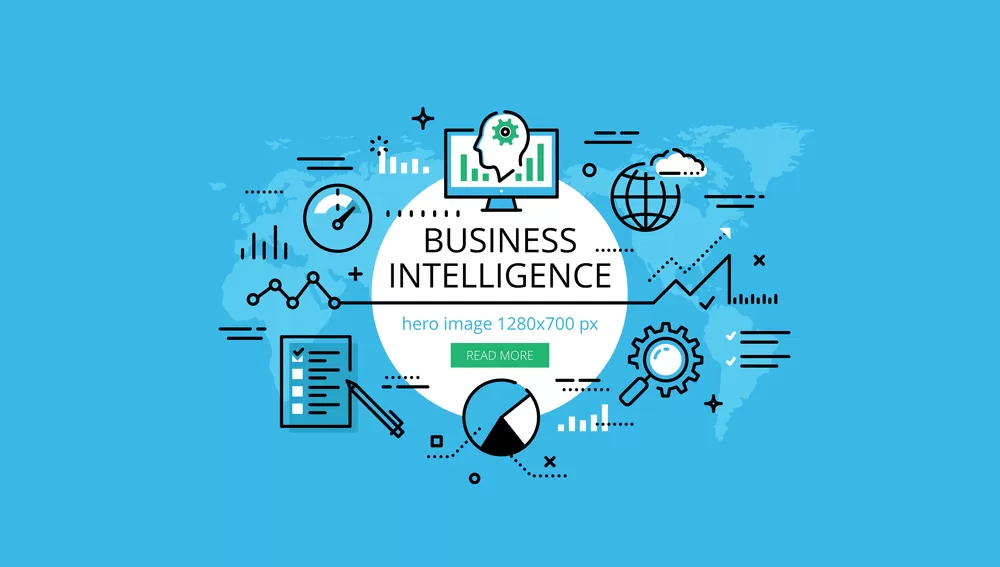Written By:
Scott McAuley
Scott is the IT Director of Texas Management Group, and has been in the IT industry for 25 years.
In today’s fast-paced business world, data is the key to making smarter decisions. But how do companies turn all that raw data into actionable insights? That’s where the advantages of Business Intelligence come in.
Business Intelligence (BI) helps organizations analyze data, uncover trends, and make informed decisions that drive success. In 2024, leveraging BI is more important than ever for staying ahead of the competition.
In this article, we’ll explore 15 key advantages of Business Intelligence and how it can transform your business operations.
Curious to see how BI can unlock your company’s potential? Let’s dive into the benefits that can take your decision-making to the next level.
Key Takeaways
- Business Intelligence enables data-driven decision-making, helping companies analyze trends and make informed choices that align with long-term business goals for competitive advantage.
- BI improves operational efficiency by identifying and resolving inefficiencies, leading to more streamlined processes and optimized business performance across departments.
- Predictive analytics within BI provides accurate forecasting, helping companies anticipate future trends and adjust strategies accordingly to stay ahead of the market.
- Real-time reporting and monitoring through BI tools ensure faster response times, enabling businesses to act quickly on insights and maintain agility in a dynamic market.
- Enhanced customer experience is a major benefit of BI, as it allows companies to better understand customer behaviors and preferences, improving product offerings and service delivery.
Table of Contents
What is Business Intelligence (BI)?

Business Intelligence (BI) focuses heavily on Key Performance Indicators (KPIs). These metrics help companies measure their performance effectively.
With advanced BI software, businesses can analyze data deeply. This leads to smarter strategies for growth and efficiency.
Modern BI tools simplify the process of identifying trends. These insights enable better decision-making in both short-term and long-term planning.
BI systems also foster team collaboration. Teams can share dashboards in real-time, ensuring everyone stays informed.
As companies expand, BI software scales alongside them. This ensures businesses can adapt to new data sources and needs.
How Does Business Intelligence Work?
Business intelligence (BI) systems function like a well-tuned machine. They continuously gather, analyze, and present data for informed decision-making.
BI collects data from various sources, such as databases, spreadsheets, and software applications. This data is then transformed into actionable insights through reporting, data visualization, and predictive analytics.
Imagine BI platforms working non-stop to process information from sales, customer interactions, and more. The data is analyzed and presented in a way that’s easy to understand.
BI tools create visualizations like charts and dashboards, making complex data simple. This helps businesses quickly recognize patterns, trends, and areas for improvement.
Let’s break down how data appears before and after using BI tools:
| Data Type | Pre-BI Visualization | Post-BI Visualization |
|---|---|---|
| Sales Performance | Spreadsheet with monthly figures | Interactive trend line showing growth patterns |
| Customer Engagement | Collection of email and call logs | Heat map highlighting engagement hotspots and drop-offs |
| Operational Efficiency | List of production timelines | Bar chart comparing actual performance to optimal timelines |
| Financial Health | Quarterly financial reports | Dashboard with profitability ratios and expense breakdowns |
With these tools, businesses can easily interpret data. They can quickly take action based on real-time insights and trends.
15 Advantages of Business Intelligence
Business intelligence (BI) systems transform companies worldwide. They let organizations make smart choices based on their internal data. This boosts business performance in big ways.
Here are the top 15 key benefits of BI for businesses.
| Advantage | Description |
|---|---|
| Data-Driven Decision Making | Shifts companies towards informed decision-making using data analysis. |
| Enhanced Operational Efficiency | Improves operations by identifying and rectifying inefficiencies. |
| Improved Forecasting and Planning | Helps predict future events and make strong plans based on past patterns. |
| Competitive Advantage | Provides insights that give businesses a competitive edge over rivals. |
| Increased Revenue and Profitability | Enables companies to boost earnings and profitability through data-driven strategies. |
| Enhanced Customer Experience | Helps understand customer needs better, leading to improved service and products. |
| Real-Time Reporting and Monitoring | Facilitates continuous tracking of key business metrics for quick decision-making. |
| Risk Mitigation | Identifies and addresses potential risks before they escalate. |
| Better Inventory Management | Optimizes inventory levels to meet demand effectively. |
| Regulatory Compliance | Ensures adherence to regulations and compliance standards, reducing the risk of fines. |
| Employee Productivity | Equips employees with the right information to enhance efficiency and reduce wasted time. |
| Improved Strategic Planning | Assists in aligning strategies with long-term goals through deep data analysis. |
| Faster Time to Market | Accelerates the launch of new products or services by evaluating market demands efficiently. |
| Enhanced Customer Retention | Helps retain customers by understanding their preferences and addressing their needs effectively. |
| Scalability and Flexibility | Enables BI systems to adapt and grow with the business, ensuring agility and competitiveness. |
1. Data-Driven Decision Making
BI shifts companies from guessing to data-driven decision-making. It lays the groundwork for more informed business decisions. Leaders can guide their companies with confidence, using solid evidence from BI analysis.
2. Enhanced Operational Efficiency
BI makes operations smoother by finding and fixing inefficiencies. It looks at past and current data to improve how things are done. This results in better results.
3. Improved Forecasting and Planning
BI is a big help in predicting what’s coming. It looks at old patterns to help make strong plans. These plans match up with likely future events.
4. Competitive Advantage
BI gives businesses a leg up over others. It offers insights that competitors might miss. This helps businesses stand out and beat the competition in key ways.
5. Increased Revenue and Profitability
BI helps companies make more money and become more profitable. It finds new ways to earn and boosts the bottom line. Acting quickly on these opportunities is crucial.
6. Enhanced Customer Experience
BI tools help understand what customers want and do. This leads to better service and products. Companies can then better meet their customers’ specific needs.
7. Real-Time Reporting and Monitoring
BI allows for the continuous tracking of key business metrics. Real-time reports and monitoring make this easy. This lets businesses react fast to changes.
8. Risk Mitigation
BI helps identify potential problems before they grow. It sees patterns that could lead to issues. This helps in making plans to avoid those risks.
9. Better Inventory Management
BI is great for improving how inventory is managed. It predicts what’s needed and keeps stock levels just right. This avoids having too much or too little, keeping customers and operations happy.
10. Regulatory Compliance
Following rules is important, and BI helps with this. It keeps track of compliance, avoiding fines. Monitoring compliance metrics helps companies stay within the law.
11. Employee Productivity
BI gives employees the data they need to work well. Having the right information reduces wasted time. It lets employees focus on what’s important.
12. Improved Strategic Planning
BI sharpens strategic planning with deep data analysis. This helps meet long-term goals more precisely. Businesses align their strategies with current data trends thanks to BI.
13. Faster Time to Market
BI reduces the time it takes to launch new products or services. It evaluates market demands and internal readiness. This speeds up the time to market.
14. Enhanced Customer Retention
Knowing what makes customers stay is key. BI tools provide this understanding. This knowledge helps companies keep customers and reduce lost ones.
15. Scalability and Flexibility
BI systems grow with your business. They adjust to growth and change easily. Their adaptability lets businesses stay agile and overcome competitors.
5 Types of Business Intelligence Categories
Businesses today deal with increasingly complex data. Understanding the five core Business Intelligence (BI) categories is crucial for staying competitive. These categories help businesses transform raw data into valuable insights.
Here are the 5 types of business intelligence categories:
| BI Category | Focus | Benefit |
|---|---|---|
| Descriptive Analytics | Analyze past data | Understand historical performance |
| Diagnostic Analytics | Identify causes of outcomes | Improve decision-making |
| Predictive Analytics | Forecast future trends | Strategize for upcoming changes |
| Prescriptive Analytics | Provide actionable recommendations | Implement data-driven strategies |
| Self-Service BI | User-friendly data access | Empower non-experts to analyze data |
1. Descriptive Analytics
Descriptive Analytics focuses on analyzing past data to uncover trends. This provides businesses with a clear view of past performance. By understanding historical patterns, companies can make better strategic decisions for the future.
2. Diagnostic Analytics
Diagnostic Analytics digs deeper to understand why specific outcomes occurred. It helps identify the causes behind trends and behaviors. This is essential for optimizing business processes and improving customer satisfaction.
3. Predictive Analytics
Predictive Analytics uses past data to forecast future trends. It equips businesses with the ability to anticipate market shifts. By staying ahead of potential changes, companies can adapt strategies to meet future demands.
4. Prescriptive Analytics
Prescriptive Analytics goes beyond predictions by offering actionable recommendations. It suggests the best course of action based on predicted outcomes. This empowers businesses to implement proactive, data-driven strategies for growth.
5. Self-Service BI
Self-Service BI democratizes data analysis, allowing non-experts to explore data. It enables teams to make decisions without relying on data specialists. This promotes a culture of data-driven decision-making at every level of the organization.
How Business Intelligence is Implemented Within Organizations
Integrating business intelligence within an organization starts with a solid plan. Business leaders first ensure BI system goals match the company’s objectives.
This step is key for the business intelligence dashboards to help the company’s main activities.
Next, choosing the right BI systems is critical. They must meet the organization’s unique data needs. After finding the best tools, setting up business intelligence dashboards follows.
These dashboards track key business metrics and offer actionable insights for data-driven business decisions.
BI’s true strength shows when insights are shared across different teams. Here’s how BI metrics can be used in various departments:
| Department | Metrics | Actionable Insights |
|---|---|---|
| Sales | Monthly Sales Growth | Focus areas for sales training based on regional performance |
| Marketing | Customer Acquisition Cost | Adjustment of marketing channels to optimize spend |
| Operations | Supply Chain Efficiency | Identification of bottlenecks in logistics for improvement |
| HR | Employee Turnover Rate | Initiatives for enhancing employee engagement and retention |
| Customer Support | Average Resolution Time | Strategies to streamline support processes and improve customer satisfaction |
Tips for Implementing Business Intelligence
Starting a Business Intelligence (BI) project empowers your company to make smarter decisions. Leveraging timely and real-time data is key to gaining insights and staying competitive.
To fully benefit from BI, careful planning of the implementation process is crucial. This guide outlines how to extract valuable insights from your data and maintain its quality:
Define Clear Objectives
Start by defining what you want to achieve with BI. Focus on specific goals like improving data accuracy or boosting operational efficiency.
Set SMART goals: Specific, Measurable, Achievable, Relevant, and Time-bound. This approach ensures clear direction and focus.
Secure Executive Support
BI projects thrive when leadership is on board. Executive support ensures you have the resources and company-wide acceptance for the new system.
Leaders also help drive cultural change, ensuring BI becomes an integral part of daily decision-making.
Assess Data Quality
For BI to work effectively, your data needs to be clean and accurate. Regularly assess and maintain data quality to ensure it’s suitable for analysis.
Cleaning your data early on prevents issues later, ensuring that insights are trustworthy and actionable.
Choose the Right BI Tools
Select BI tools that align with your business needs and can scale as your company grows. Consider ease of use, integration with existing systems, and the level of customer support available.
User-friendly tools encourage widespread adoption and ensure that insights are easily accessible.
Prioritize User Training
Proper training helps your team unlock the full potential of BI tools. Equip employees with the knowledge to analyze data and extract key insights effectively.
Effective training leads to better decision-making across the organization.
Foster a Data-Driven Culture
Encourage employees to make decisions based on data rather than intuition. This data-driven approach fosters innovation and drives continuous improvement.
A strong data culture enables faster adaptation to market changes and new opportunities.
Start Small, Scale Gradually
Begin with a small BI pilot focused on one team or a specific metric. As the benefits become clear, gradually expand BI usage to include more data and teams.
This approach ensures smoother adoption and reduces risks associated with large-scale implementation.
Conclusion
Business Intelligence (BI) is a game-changer for businesses looking to harness the power of data in 2024. It transforms raw data into actionable insights, enabling companies to make informed decisions that drive success.
By leveraging BI tools, businesses can improve efficiency, boost profitability, and stay ahead of the competition. The key lies in understanding how to implement and utilize these tools to maximize their benefits.
Now is the time to embrace BI for smarter decision-making and future-proof your operations. Ready to unlock your company’s potential?
Explore more BI strategies and insights at texmg.com, and take the next step in elevating your business performance!
Data is Key to Growth—Are You Using it Effectively?
Our blog offers guidance on optimizing business intelligence, while our Data Management Services ensure you have clean, actionable data for every move.
Transform your data approach today!
FAQ
What is the Significance of Business Intelligence?
Business intelligence (BI) helps organizations make data-driven decisions by analyzing and interpreting large volumes of data to uncover actionable insights and trends.
What Does a Business Intelligence Role do?
A business intelligence role involves collecting, analyzing, and interpreting data to provide insights that support strategic decision-making and business operations.
What is the Process of Business Intelligence?
The process of business intelligence involves data collection, data integration, data analysis, data visualization, and decision-making based on the insights derived from the analysis.
What is Required for Business Intelligence?
Business intelligence requires access to quality data sources, robust data analytics tools and technologies, skilled data analysts or business intelligence professionals, and a clear understanding of organizational goals and objectives.






